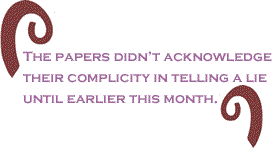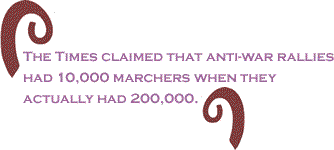
|
|||||||||||||||||||||
 |
“. . . the decisions made at the Herald and the Leader hurt the civil rights movement at the time, irreparably damaged the historical record and caused the newspapers' readers to miss out on one of the most important stories of the 20th century.” – Lexington Herald-Leader, July 4, 2004 “If a tree falls in the forest and no one is there to hear it does it still make a sound?” This philosophical conundrum has been debated for generations. The question is an interesting one, but it can be applied to issues other than trees. If a revolution took place and the press ignored it, did it still happen? The city of Lexington, Kentucky, like so many other communities, experienced the fall of an entire forest in the 1950s and 1960s. The civil rights movement brought wrenching changes to the entire nation. Lexington was not exempt. Unfortunately, anyone depending on Lexington’s newspapers for information would not have known to shout “timber” and get out of the way when the redwoods began hitting the forest floor.
The Herald-Leader (the two papers merged in the 1980s) recently apologized to readers for not reporting that the fair city of Lexington had a civil rights movement. The white citizenry of Lexington decided that pretense was preferable to the truth and chose not to point out the elephant in the living room. “Good” white people like Fred Wachs, general manager and publisher of both newspapers, said they wanted change, but didn’t think that anyone demanding it was worthy of an expenditure of newsprint.
"He didn't like the idea of some of these rabble rousers coming in and causing trouble," Fred Wachs Jr. said of his father, who died in 1974. "He tried to keep that off the pages. But he supported school desegregation, and they wanted it done without any problems, and I don't think we had any problems here." The godfathers of Lexington told people where they could and could not live, and could and could not work, and could and could not go to school and yet were not labeled rabble rousers. That honor fell on those who risked death, injury and loss of livelihood to demand a just society. As for problems, it is certainly true that Lexington had problems. Audrey Ross Grevious was one of the movement organizers in Lexington. During a sit-in at a lunch counter the manager swung a chain barrier into her legs for several hours, causing her pain that continues until this day. Audrey Ross Grevious certainly had problems in Lexington.
It is doubtful that anyone was fooled by the news white-out. Black people certainly knew what was going on. They were the ones taking the action. Their white neighbors also knew that something had changed. People don’t refrain from talking about something because the newspapers are silent. They knew that protests were taking place, even if their leaders didn’t want to bother their pretty little heads about it. Of course there was another very simple reason to deny the existence of the movement in Lexington and other cities. The lack of coverage discouraged activism. Many more people would have been galvanized by the courage of Audrey Ross Grevious and thousands of others. Calvert McCann was a young man who photographed the events in Lexington. He says that if the revolution had been televised or even reported in the paper, “I think there may have been more people would have joined, and more interest in the movement …” It is easy to pass judgment against the pillars of the segregationist Lexington community but it is more difficult to ask about the present day elite corporate media in the North. Thirty years after a newspaper brought down a corrupt presidency, the New York Times recently apologized for not living up to journalistic standards when it went along with the Bush administration propaganda that Saddam Hussein had stockpiles of chemical weapons.
The flimsy mea culpa went along these lines. “We did not listen carefully to the people who disagreed with us.” It would have been a lot better if powerful opinion makers like the Times had given legitimacy to opposing points of view before 12,000 Iraqis and 800 American soldiers were killed. July must be the official “better late than never” month for national newspapers. The New York Times today cannot claim to be superior to local papers published in Lexington, Kentucky forty years ago. The Times claimed that anti-war rallies had 10,000 marchers when they actually had 200,000 and the Times ignored the very existence of the lesser known and/or politically inconvenient candidates in presidential election debates. Everyone knows that we shouldn’t believe everything that we read, and not just because the information may be faulty. We must also assume that important truths are left out of news coverage. The press are embedded with the powerful, whether in Kentucky or New York, and they continue to cause irreparable damage to the historical record. Margaret Kimberley’s Freedom Rider column appears weekly
in |
July
22 2004 |
|||||||||
|
|||||||||
|
|
|||||||||
| Printer Friendly Version | |||||||||
 |
|||||||||
| |
|||||||||
| |
|||||||||




























